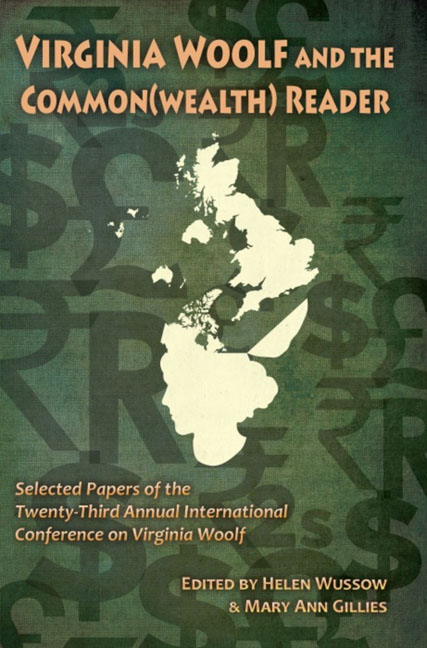Book contents
- Frontmatter
- Contents
- Introduction to Virginia Woolf and the Common(wealth) Reader
- Acknowledgments
- List of Abbreviations
- Invocations
- Networks of Affiliation: Foundations and Friends
- Education and Empire in Victorian Bloomsbury
- Synthesizing Civilizations: Leonard Woolf, the League of Nations, and the Inverse of Imperialism, 1928–1933
- James Stephen's Anti-Slavery Politics: A Woolfian Inheritance
- Networks of Empire: Virginia Woolf and the Travel Writing of Emily Eden
- Of Scrapbooks, War, and Newspapers: Leslie Stephen's Legacy
- Leslie Stephen's Science of (Ecological) Ethics
- “The Death of a Beautiful Man”: Rupert Brooke in Memory and Imagination
- Leonard Woolf and the Ceylon Civil Service: “I had come to dislike imperialism”
- Virginia Woolf in the British Commonwealth
- Woolf and the Commonwealth
- 1930s Onwards
- Woolf Beyond the Book
- Notes on Contributors
- Conference Program
Synthesizing Civilizations: Leonard Woolf, the League of Nations, and the Inverse of Imperialism, 1928–1933
from Networks of Affiliation: Foundations and Friends
- Frontmatter
- Contents
- Introduction to Virginia Woolf and the Common(wealth) Reader
- Acknowledgments
- List of Abbreviations
- Invocations
- Networks of Affiliation: Foundations and Friends
- Education and Empire in Victorian Bloomsbury
- Synthesizing Civilizations: Leonard Woolf, the League of Nations, and the Inverse of Imperialism, 1928–1933
- James Stephen's Anti-Slavery Politics: A Woolfian Inheritance
- Networks of Empire: Virginia Woolf and the Travel Writing of Emily Eden
- Of Scrapbooks, War, and Newspapers: Leslie Stephen's Legacy
- Leslie Stephen's Science of (Ecological) Ethics
- “The Death of a Beautiful Man”: Rupert Brooke in Memory and Imagination
- Leonard Woolf and the Ceylon Civil Service: “I had come to dislike imperialism”
- Virginia Woolf in the British Commonwealth
- Woolf and the Commonwealth
- 1930s Onwards
- Woolf Beyond the Book
- Notes on Contributors
- Conference Program
Summary
A discussion of the League of Nations, disarmament, arbitration, international co-operation, and the prevention of war will seem to many people at the moment academically utopian.
—Leonard Woolf, IMWPW 17This paper carries forward from an earlier time the treatment of work undertaken by Leonard Woolf, with the notable assistance of his wife and several associates, on various projects for the Fabian Society, the League of Nations Society, and the Labour Party Research Department. During the First World War, by his own account, he “worked with others to ensure that the creation of a League of Nations should be part of the peace settlement” (L. Woolf, Au 5: 156). Until 1946, he “worked as Secretary of the Labour Party Advisory Committee on International Affairs to try to get the Executive Committee of the Labour Party and secondarily the Parliamentary Party to make the League and the system and its development the essence, the motive power, of their international policy” (ibid.). Other Advisory Committee “‘experts’ on foreign affairs” included three of the seven enlisted by him in 1933 to argue that “intelligent” leaders might execute the articles of the League Covenant to prevent war. The three were Norman Angell, W. Arnold-Forster, and C. R. Buxton. As Michele Barrett observes in her excellent essay in the latest Woolf Studies Annual, Leonard Woolf was regarded as “more or less the Fabian and Labour Party ‘expert’ in international imperial questions” after he had written Empire and Commerce in Africa (1920) in 1918 (LW qtd. in Barrett 109). For me, the story begins with a Quaker conference during the war and assistance given in the dictation and revision of a paper on international relations almost immediately abridged as an introduction to the proceedings in Angell's journal War and Peace, afterwards retitled The International Review and guest-edited by Woolf. Professor Barrett generously outlines enough of the argument of Janet Manson and yours truly in essays of 1991 and 1998 and a Bloomsbury Heritage booklet, entitled Leonard and Virginia Woolf Working Together (1997), that I can spare developing the back-story of this paper.
- Type
- Chapter
- Information
- Virginia Woolf and the Common(wealth) Reader , pp. 18 - 26Publisher: Liverpool University PressPrint publication year: 2014



